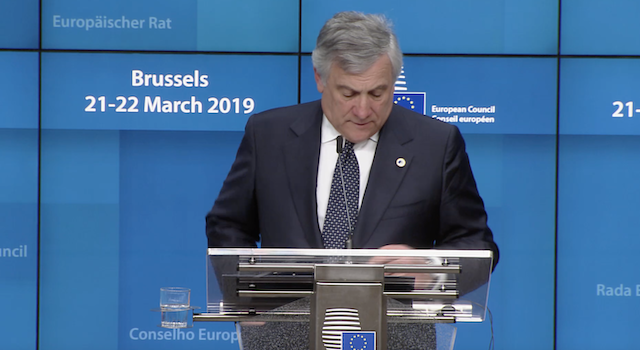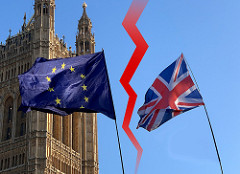
The sand in the Brexit hour glass has almost run out. Or has it?
A couple of years ago, UK’s parliament quickly agreed to invoke Article 50 for her to leave the EU. However, as has been said before, “the devil is in the details”. Many in both the EU and in the UK see the drawn-out Brexit process as a complete mess.
Some Brits in UK’s parliament, and on the street, said “Just get on with it”; others complained they were being bullied into accepting a bad deal.
UK’s March Madness
With the original deadline of Friday March 29th mere days away, here are the latest developments.
The week of March 10th, UK’s House of Commons voted against both exiting the EU without a deal or having a 2nd referendum on Brexit before the March deadline. The parliament did, however, vote in favor of requesting a delay.
At that time, an extension was thought to be far from certain. The other EU 27 member states had to unanimously agreed, and not all were not convinced more time would make a difference.
The upcoming EU’s parliamentary election also significantly complicated the timing. The European Union wanted UK’s membership in the EU settled before May 23rd.
In a BBC article on March 14, 2019, titled, “Four Brexits and a Divorce: What do MPs want?” BBC said,
“The basic choice facing MPs has always been the same: If they don’t want the UK to leave without a deal … they must either pass a withdrawal agreement, revoke Article 50 or ask the EU for an extension.”
Unexpected Action

The Prime Minister planned to call for a revote on the Brexit Deal before the deadline. But, on Monday March 18, House of Commons Speaker, John Bercow, made a surprise announcement. Citing precedent, he said the withdrawal agreement could not be reconsidered unless it was significantly changed.
As the prime minister scrambled to figure out what to do next, some Britains hoped that the EU would be more inclined to grant the UK additional time after the speaker’s statement.
Compromise Proposal
On March 20th, Roger Casale, former UK MP (member of Parliament) remarked,
“It’s a great irony that in 2016 one of the reasons that many people said they voted to leave was to take back control. Well, tonight control is with the European Union … “
Mr. Casale sent a letter in early February to both the EU and UK government proposing a compromise solution. Essentially, it included 3 key points. These were a short extension, as well as a second referendum, plus acceptance of the withdrawal plan — the EU deal, obviously, would only go into effect if the public voted for the Brexit measure again.
Some MPs now view his proposal as the way forward.
Grace Period
The UK was granted more time. But, it’s conditional.

According to euronews, on Thursday March 22nd, the EU offered the UK two options: One, if it ratifies the deal next week, is an extension until May 22, the day before the start of its parliamentary elections. But if the current deal is not accepted, the UK will have only until April 12th to decide whether to crash out with no deal on May 22nd or choose to vote in the EU elections and have a chance at more time to explore other actions.
The EU also offered extra assurance to the UK that should the backstop be needed, it will only be temporary. It is called the Strasbourg Agreement.
The Prime Minister has only five working days left to secure the needed UK MP votes for a motion that’s been modified enough to be introduced. Technically, the terms of the deal can’t be changed. Perhaps, however, the EU’s Strasbourg agreement and extension clauses can be added, so it qualifies as something new. But under the circumstances, can PM May deliver the goods?
Breaking News 03-29-2019: The EU Withdrawal Agreement was not passed. So, as of today, the deadline is extended to April 12th.
Photo Credits: EU Summit Courtesy of European Union; Hour glass by Clker-Free-Vector-Images, License: CC0; Flags by Christoph Scholz, License: CC BY-SA 2.0.
Related reading: Brexit and Modern-Day Ephraim